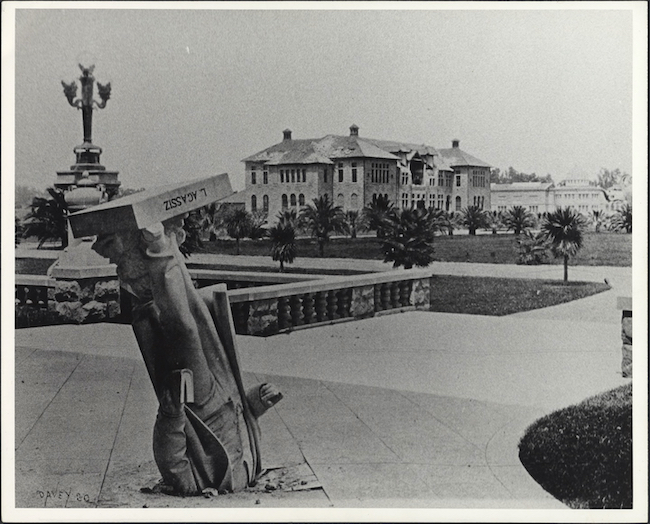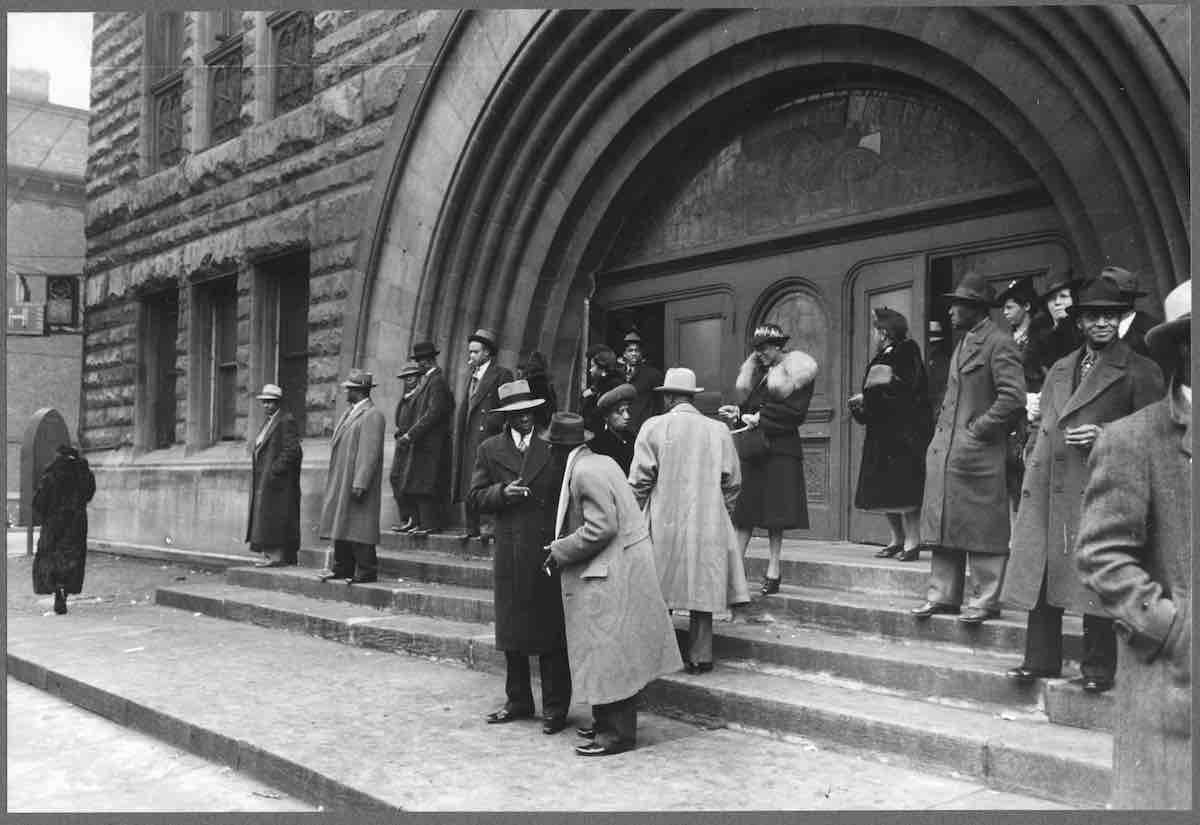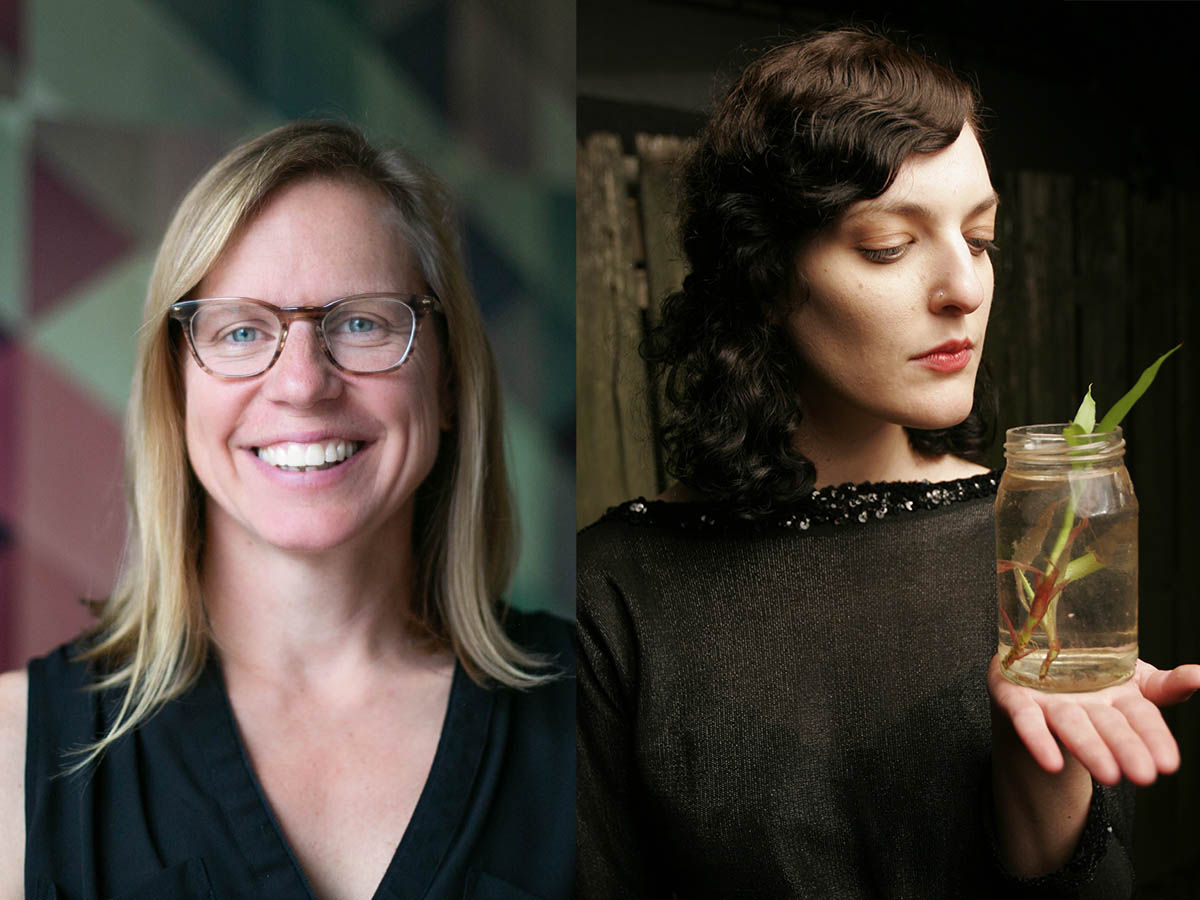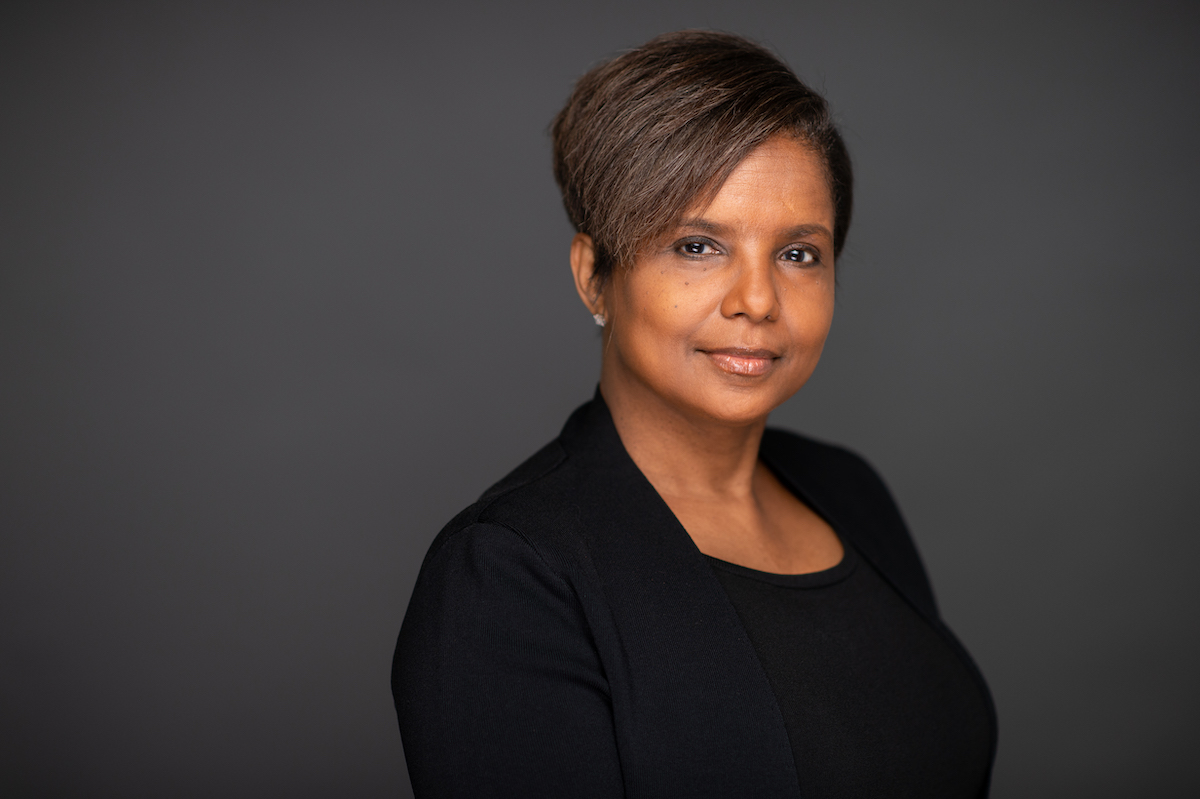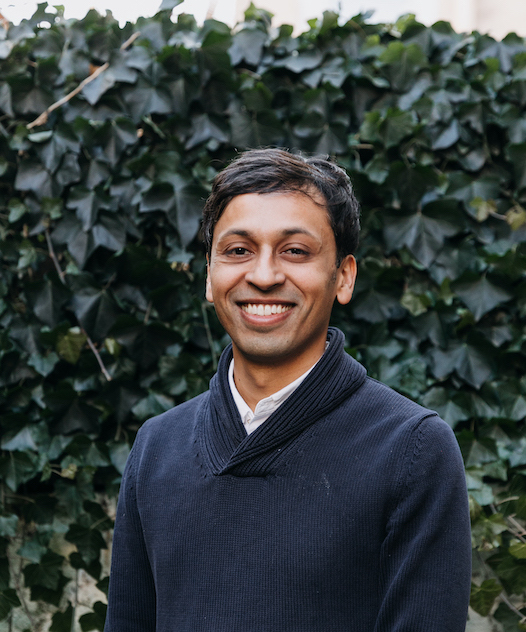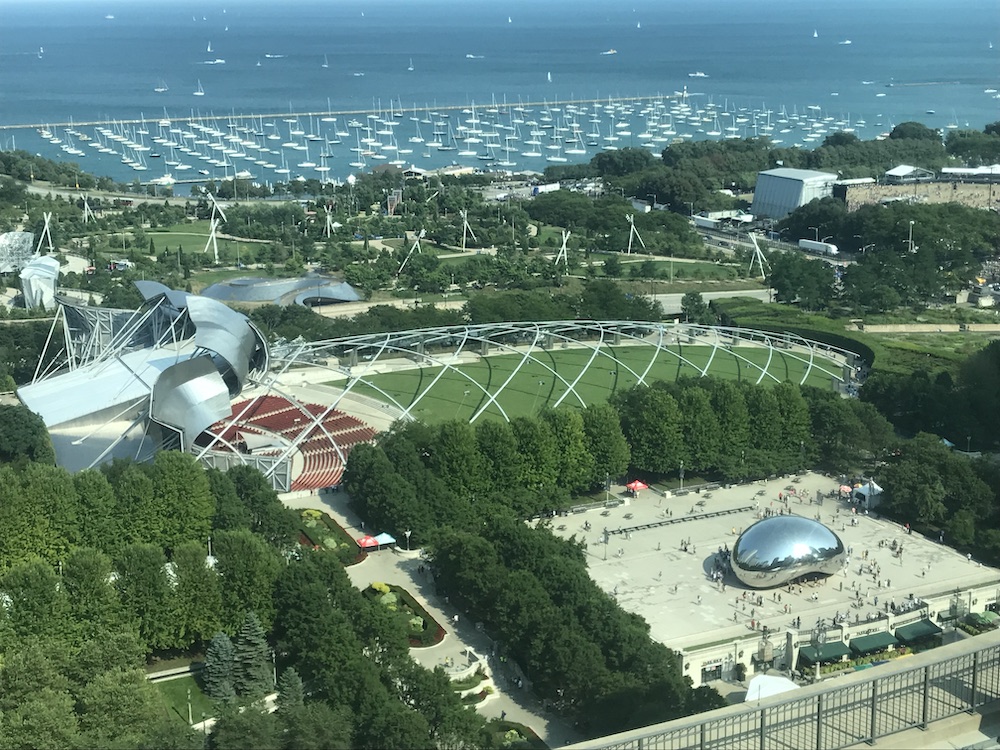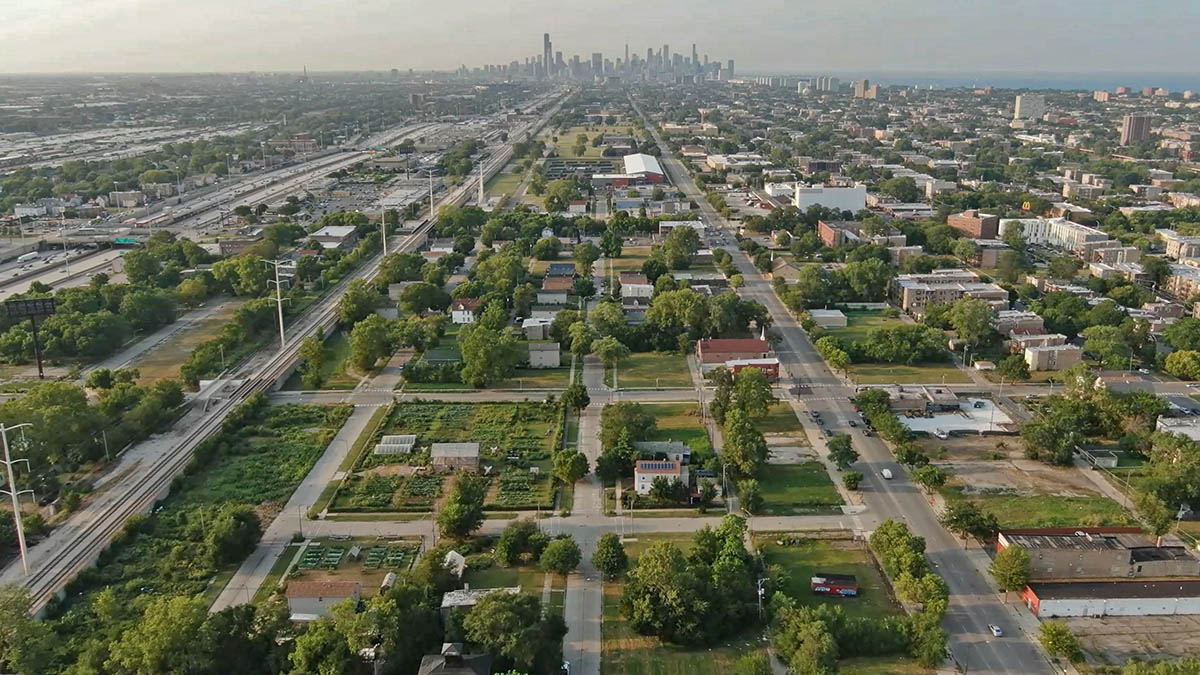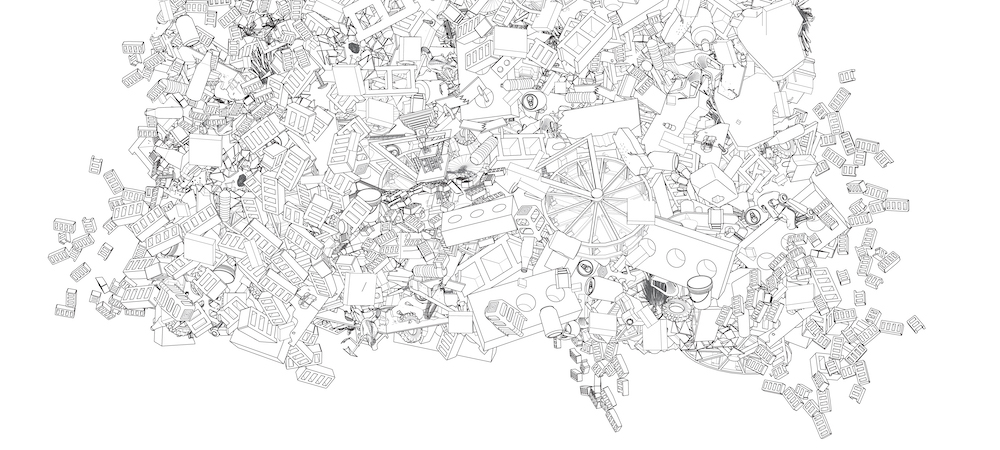Kathryn Yusoff, “Geo-Logics: Natural Resources as Necropolitics”
The GSD is pleased to present a series of talks and webinars broadcast to our audiences via Zoom.
*This lecture will be ONLINE ONLY. For security reasons, virtual attendees must register. Scroll down to find complete instructions for how to register.
Event Description
This talk addresses how natural resources are the dominant and normative modality of matter, one that is predicated on and institutionalizes racialized relations. Two stratal relations deployed in the making of natural resources in the U.S. are addressed. First, the stratigraphic imagination of race in Louis Agassiz’s geographic race maps and portraits of the enslaved, alongside his scientific and political claims about polygenesis, plantations and the enduring legacy of racial difference. The second strata examines a convict lease prison mine in Birmingham, Alabama, which helped build the ‘Magic City’ and floated U.S. Steel on the stock exchange. This example of the carceral form of ‘natural resources’ and the undergrounding of black life during and after Reconstruction built the white surfaces of Modernity, enacting the stratigraphic imagination of racial difference as surface and mine. I consider both these accounts of materiality as affective infrastructures of White Geology that point to broader sites in the racializing geo-logics of natural resources and the decolonizing of matter. Within the talk I will address questions of material memory and redress, alongside the weaponization of geology through natural resources as an affectual architecture of racializing difference.
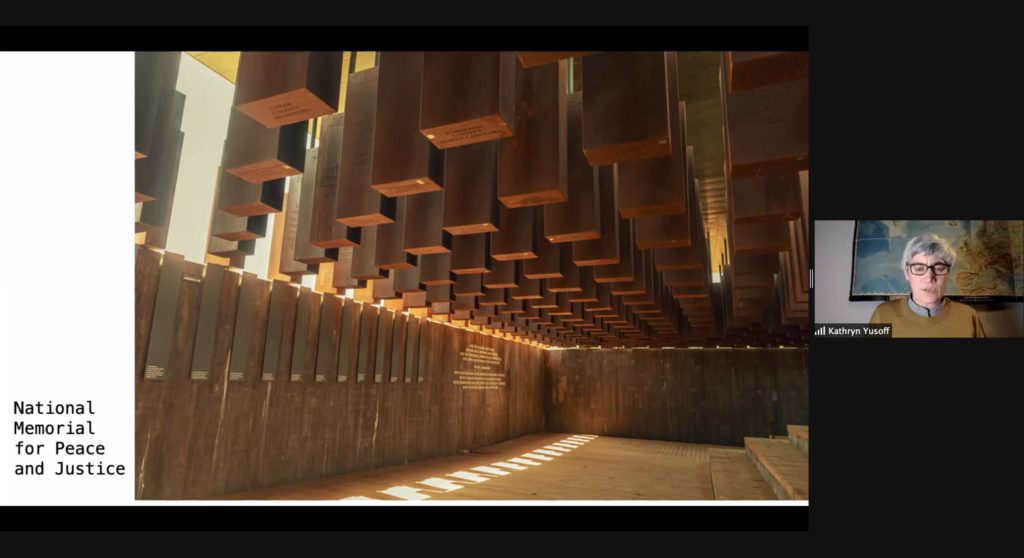
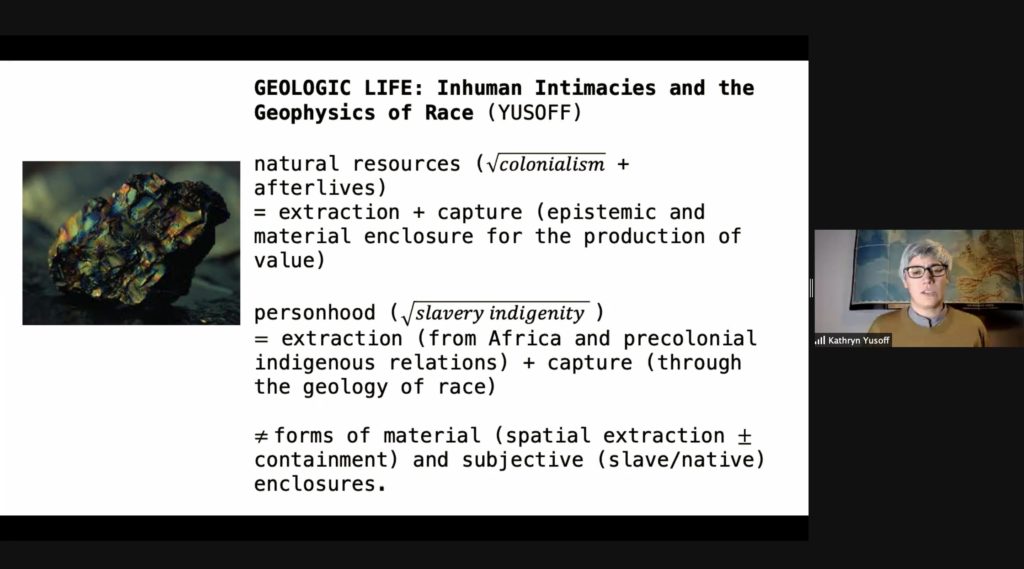
Speaker
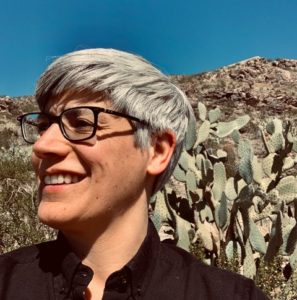
Kathryn Yusoff is Professor of Inhuman Geography in the School of Geography at Queen Mary, University of London, Mile End Road E1 4NS, U.K. Most recently, she is author of A Billion Black Anthropocenes or None , Minneapolis (University of Minnesota Press, 2018), a SI on “Geosocial Formations and the Anthropocene” (with Nigel Clark) in Theory Culture and Society, “Epochal Aesthetics” in E-flux, and Geologic Life: Inhuman Intimacies and the Geophysics of Race (forthcoming). Yusoff can be reached at [email protected].
Follow Kathryn Yusoff on Twitter .
How to Join
Register to attend the lecture here . Once you have registered, you will be provided with a link to join the lecture via Zoom. This link will also be emailed to you.
The event will also be live streamed to the GSD’s YouTube page . Only viewers who are attending the lecture via Zoom will be able to submit questions for the Q+A. If you would like to submit questions for the speaker in advance of the event, please click here .
Live captioning will be provided during this event. A transcript will be available roughly two weeks after the event, upon request.
“The Architecture of Democracy”
The GSD is pleased to present a series of talks and webinars broadcast to our audiences via Zoom.
*This lecture will be ONLINE ONLY. For security reasons, virtual attendees must register. Scroll down to find complete instructions for how to register.
Event Description
In the week before the U.S. general election, Harvard and MIT will share a public discussion on the role of architecture in a representative democracy. Azra Aksamija, Michelle Chang, Nicholas de Monchaux, Iman Fayyad, Huma Gupta, Mark Lee, Rafi Segal, and Yasmin Vobis will join in dialogue on the profession’s role in supporting democratic society, now and in the future.
This event is convened by Mark Lee and Nicholas de Monchaux and is a collaboration between the GSD Department of Architecture and MIT Department of Architecture . Follow @harvardGSD and @mitarchitecture.
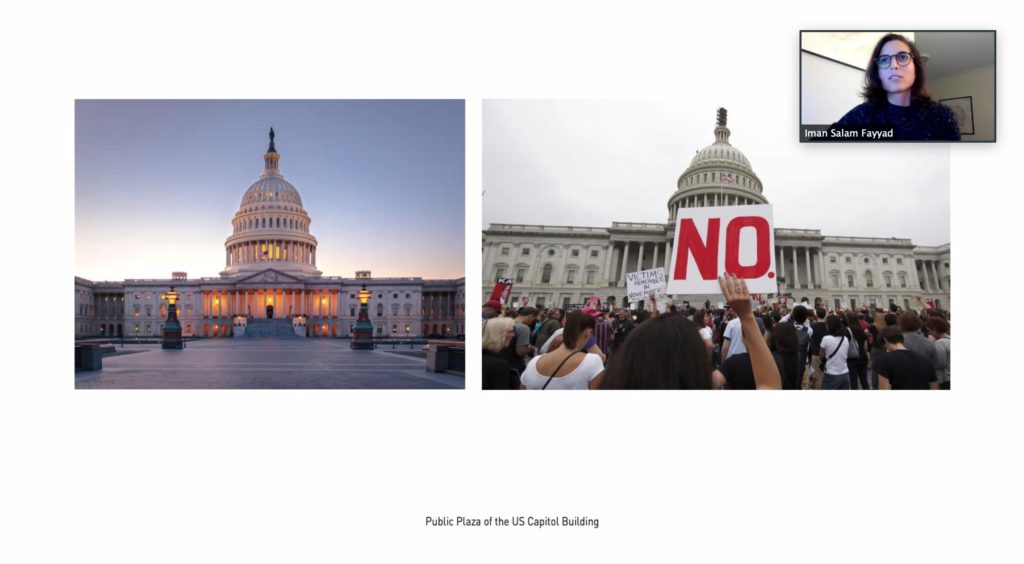
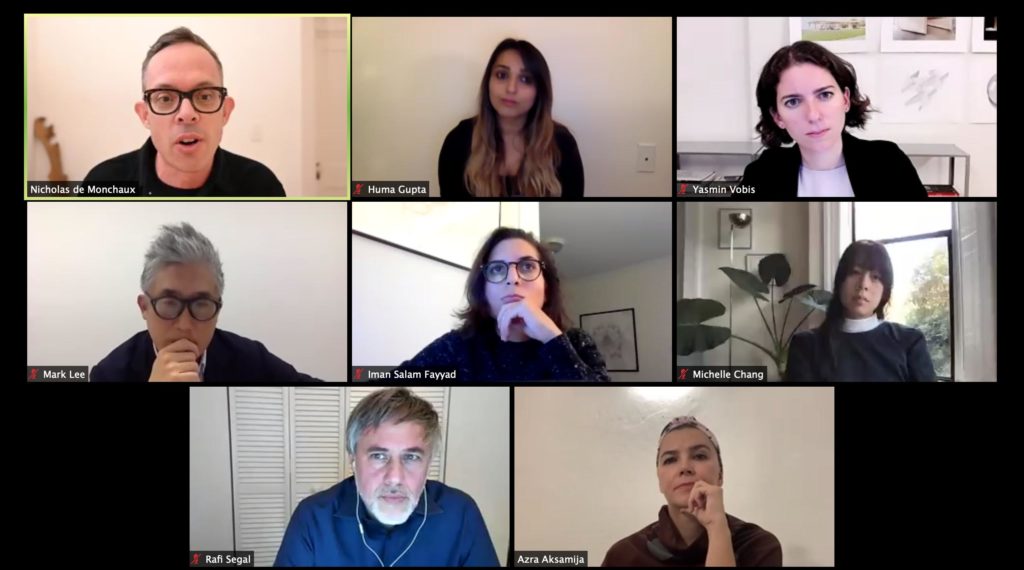
Speakers
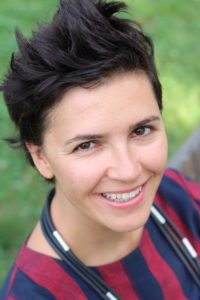
Azra Aksamija , PhD is an artist and architectural historian. She the founding Director of theMIT Future Heritage Lab (FHL) and an Associate Professor in the MIT Program in Art, Culture and Technology (ACT). Her work explores how social life is affected by cultural bias and by the deterioration and destruction of cultural infrastructures within the context of conflict, migration, and forced displacement. [MORE ]

Michelle Chang directs JaJa Co and teaches architectural design. She founded her independent practice in 2014 after working in offices in New York, Boston, and San Francisco. Her design work experiments with the overlaps between and among film, installation, music, teaching, and building. Chang is a former MacDowell Colony Fellow, Wortham Fellow, and a recipient of the Architectural League Prize for Young Architects + Designers. [MORE]
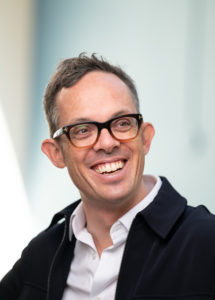
Nicholas de Monchaux is Professor and Head of Architecture at MIT. He is a partner in the architecture practice modem , and a founder of the design technology company Local Software. Until 2020 he was Professor of Architecture and Urban Design, and Craigslist Distinguished Chair in New Media at UC Berkeley, where he also served as Director of the Berkeley Center for New Media . [MORE ]
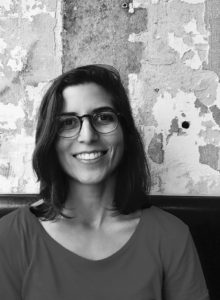
Iman Fayyad is a designer and lecturer at the Harvard Graduate School of Design. Her independent research practice uses techniques of geometry to facilitate design transformations across scales, subjects, and media. Centered on the relationship between flatness and three-dimensional form, the work celebrates the ubiquity of projective systems to relate the tectonic and material expression of architecture with modes of inhabitation, perception of space, andthe political domain in which architecture functions. [MORE]

Huma Gupta is the Neubauer Junior Research Fellow at Brandeis University. She is currently writing two books that deal with the political economy of architecture and urban development, titled The Architecture of Dispossession and Dwelling and the Wealth of Nations. She received her Ph.D. in History, Theory & Criticism of Architecture from MIT in 2020, where she was a fellow in the Aga Khan Program for Islamic Architecture. [MORE ]
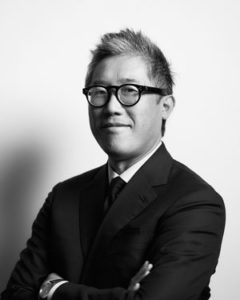
Mark Lee is a principal and founding partner of the Los Angeles-based architecture firm Johnston Marklee . Since its establishment in 1998, Johnston Marklee has been recognized nationally and internationally with over 30 major awards. A book on the work of the firm, entitled HOUSE IS A HOUSE IS A HOUSE IS A HOUSE IS A HOUSE, was published by Birkhauser in 2016. [MORE]
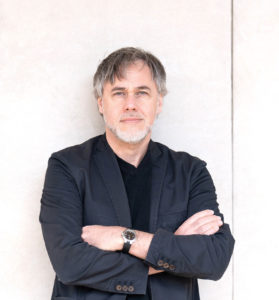
Rafi Segal is an architect and Associate Professor of Architecture and Urbanism at MIT where he directs the SMArchS Urbanism program. His work involves design and research on the architectural, urban and regional scale, currently focused on how emerging notions of collectivity can impact architecture and the design of cities. Segal directs Future Urban Collectives, a new design-research lab at MIT that explores the relation between digital platforms and physical communities asking how architecture and urbanism can support and scale cohabitation, coproduction, and coexistence. [MORE ]
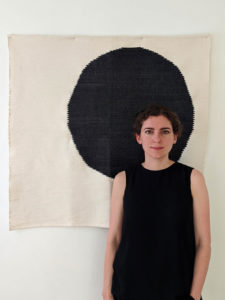
Yasmin Vobis is co-founder of Ultramoderne , an office committed to creating architecture and public spaces that are at once modern, playful, and generous. Their view that architecture is not a boutique luxury but plays an important role in all aspects of urban life, has driven them to mine the rich possibilities for contact between the discipline and the everyday. [MORE]
How to Join
Register to attend the panel discussion here . Once you have registered, you will be provided with a link to join the lecture via Zoom. This link will also be emailed to you.
The event will also be live streamed to the GSD’s YouTube page . Only viewers who are attending the lecture via Zoom will be able to submit questions for the Q+A. If you would like to submit questions for the speakers in advance of the event, please click here .
Live captioning will be provided during this event. A transcript will be available roughly two weeks after the event, upon request.
Charles Davis, “Cannon Fodder: Debating the Racial Politics of Canonicity in Modern Architectural History”
The GSD is pleased to present a series of talks and webinars broadcast to our audiences via Zoom.
*This lecture will be ONLINE ONLY. For security reasons, virtual attendees must register. Scroll down to find complete instructions for how to register.
Event Description
This talk introduces audiences to the antiracist framework for architectural history that guided the formulation of the recent monograph Building Character: The Racial Politics of Modern Architectural Style (2020). This revisionist intellectual history recovers the ways that architectural organicism provided a rationalist model of design to consciously relate the perceived racial and architectural “characters” of a nation to the people they served. From the ethnographic histories of style penned by Eugene Emmanuel Viollet-le-Duc and Gottfried Semper, to Louis Sullivan’s Chicago Style, Frank Lloyd Wright’s Prairie Style, and William Lescaze’s organic interpretation of international style public housing, modern architects were heavily invested in biological and ethnographic interpretations of individual and national identity. Using textual and physical case studies, this research demonstrates one way of revising our understanding of the western canon to account for the role of racial ideas.
The anti-racist intellectual framework for this study implicitly challenges us to come to terms with the racial politics we have inherited from the past by devising new strategies and tactics to address the cultural biases embedded within the western canon. Is the canon so compromised by its associations with white supremacy that it necessitates the elimination of any mention of its heroes and concepts today, or is it still productive to index the progress of our discipline through the lens of a flawed but widely disseminated regime of knowledge? I will speculate on one potential way forward, which is to rethink whiteness entirely so that it operates as just one of many manifestations of “world cultures,” instead of as the privileged standard for western development as it did in the past. Though this strategy may seem to preserve the canon, the final state of this lineage must be radically transformed so that any reference to it will compel us to face the ideological function of architecture as a formal and aesthetic legitimation of empire. This part of my talk follows the implications of Linda Alcoff’s book The Future of Whiteness as it relates to the current projects of reforming the western architectural canon for use in the present.
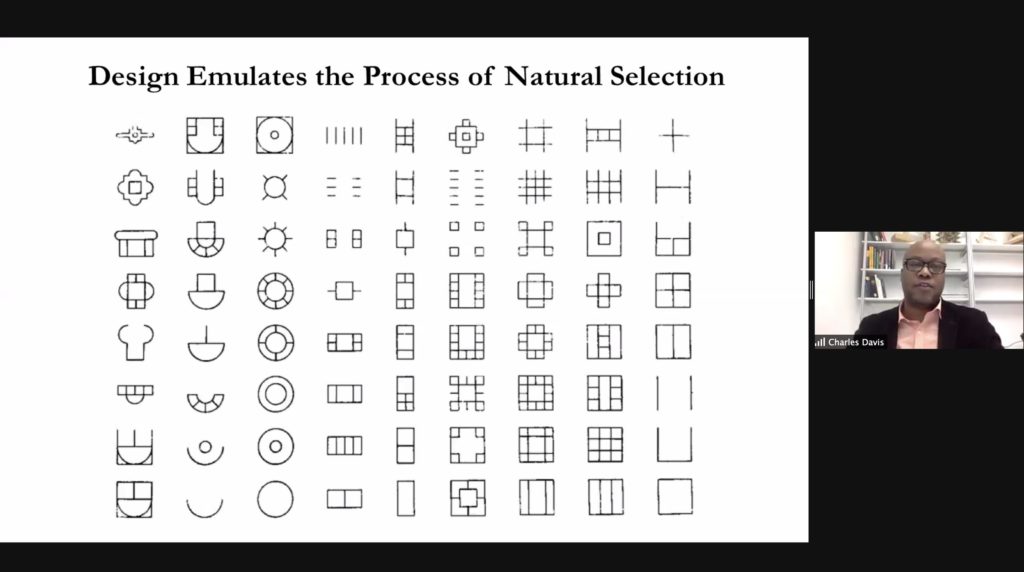
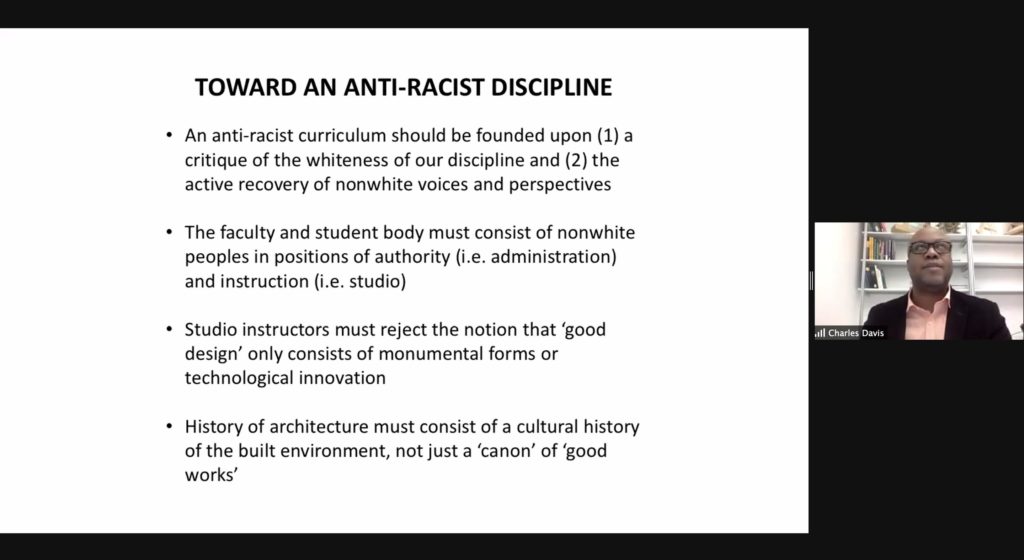
Speaker
Charles L. Davis II is an assistant professor of architectural history and criticism at the University at Buffalo, SUNY. His book manuscript, Building Character: The Racial Politics of Modern Architectural Style (University of Pittsburgh, 2019) traces the historical integrations of race and style theory in paradigms of “architectural organicism,” or movements that modeled design on the generative principles of nature. He is co-editor of Race and Modern Architecture: A Critical History from the Enlightenment (University of Pittsburgh Press). His current book project, tentatively entitled Black By Design: An Interdisciplinary History of Making in Modern America recovers the contributions of black artists in shaping the built environment from the Harlem Renaissance to Black Lives Matter. He has published articles and essays in multiple venues, including Architectural Research Quarterly, Journal of the Society of Architectural Historians, Harvard Design Magazine, Log and Aggregate. This research has been supported by grants from the Canadian Center for Architecture, the Graham Foundation, the University of Pennsylvania and the University of North Carolina.
How to Join
Register to attend the lecture here . Once you have registered, you will be provided with a link to join the lecture via Zoom. This link will also be emailed to you.
The event will also be live streamed to the GSD’s YouTube page . Only viewers who are attending the lecture via Zoom will be able to submit questions for the Q+A. If you would like to submit questions for the speaker in advance of the event, please click here .
Live captioning will be provided during this event. A transcript will be available roughly two weeks after the event, upon request.
Michael Maltzan, “Addressing Homelessness: What Can (and Can’t) Architecture Do?”
The GSD is pleased to present a series of talks and webinars broadcast to our audiences via Zoom.
*This lecture will be ONLINE ONLY. For security reasons, virtual attendees must register. Scroll down to find complete instructions for how to register.
Event Description
Over the past two decades, Michael Maltzan, FAIA, MArch ’88, and his firm Michael Maltzan Architecture have designed a variety of innovative, permanent supportive housing developments for the Skid Row Housing Trust in Los Angeles. Founded in 1995, Maltzan’s award-winning practice is dedicated to the design and construction of projects which engage their context and community through a concentrated exploration of movement and perception. The Skid Row projects serve formerly homeless people who are HIV-positive, the elderly, veterans, and/or those suffering from chronic physical and psychological disabilities. They not only provide affordable housing but also critical social infrastructure, such as health care and supportive services, that help individuals lead more stable lives.
While Maltzan has cautioned that architects have to be realistic about architecture’s ability to create wholesale social change, he has also asserted that architecture can’t stand back, and must assume an active role in the realization of sociological and psychological benefits that entities like the Housing Trust are trying to make possible.
In the 20th Annual John T. Dunlop Lecture , presented by the Harvard Joint Center for Housing Studies, Maltzan will discuss his work with the Skid Row Housing Trust and what it suggests about the ways in which architecture and other design professions can help address problems of housing affordability and homelessness. After the lecture, Mike Alvidrez , CEO Emeritus of the Skid Row Housing Trust and Helen Leung , Co-Executive Director of LA-Más, a non-profit urban design organization in Los Angeles, will provide comments and context about the lower-income and underserved communities they serve in Los Angeles. Sarah Whiting, Dean and Josep Lluís Sert Professor of Architecture at the GSD will moderate the discussion.
Speaker
Michael Maltzan , FAIA, MArch ’88, founded Michael Maltzan Architecture, Inc. in 1995. Through a deep belief in architecture’s role in our cities and landscapes, he has succeeded in creating new cultural and social connections across a range of scales and programs. Michael received a Master of Architecture degree with a Letter of Distinction from Harvard University’s Graduate School of Design and he holds both a Bachelor of Fine Arts and a Bachelor of Architecture from the Rhode Island School of Design where he received the Henry Adams AIA Gold Medal. His designs have been published and exhibited internationally and he regularly teaches and lectures at architectural schools around the world. He is a Fellow of the American Institute of Architects and a recipient of the American Academy of Arts and Letters Architecture Award.
Having devoted 28 years to ending homelessness with Skid Row Housing Trust , 14 of those years as Executive Director then Chief Executive Officer, Mike Alvidrez continues to serve the Trust following his retirement in a newly created External Ambassador role. He continues to promote the work of the Trust’s affordable and permanent supportive housing services as an evidence-based solution to breaking the cycle of homelessness. Mike is an advocate of Housing First, an innovative strategy that prioritizes the security of a permanent home as the first step to ending homelessness. Thanks to his hands-on experience, he pioneered the development of permanent supportive housing to help those facing the toughest challenges to obtaining stability and wellness. During his tenure, the Trust has become a nationally recognized provider of permanent supportive housing that is on the forefront of building and program design. By creating beautiful, dignified buildings with on-site support services, the Trust alters both how people view our residents and how our residents view themselves. A native Angelino with a Master’s degree from UCLA’s School of Architecture and Urban Planning, Mike previously worked for Community Corporation of Santa Monica.
Helen Leung , MPP ‘11, is the Co-Executive Director of LA-Más , a non-profit urban design organization that helps lower-income and underserved communities shape their future through policy and architecture. She is a Los Angeles native raised in the Frogtown neighborhood by a working class, first generation Chinese family. Growing up in an immigrant community, she deeply identifies with the rich diversity that makes Los Angeles so unique. With mentorship from local leaders, Helen became the first person in her family to go to college. Helen joined LA-Más because of her passion to explore strategies that minimize displacement pressures that come with gentrification. Helen provides leadership at LA-Más by ensuring all projects are grounded in local need and systemic change. Helen has extensive policy and community-based experience having worked for former LA City Council President and current Mayor Eric Garcetti. Her national policy and program experience includes her work as Program Associate at Living Cities, fellowship at the Office of Sustainable Housing & Communities at the U.S. Department of Housing & Urban Development, and internship at the Office of Political Affairs at the White House under President Obama’s administration. Helen serves on the Los Angeles City Planning Commission, a member of Genesis LA’s Community Advisory Board, and on the Board of the Elysian Valley Arts Collective. She holds a master’s degree in public policy and urban planning from Harvard’s Kennedy School of Government and a bachelor’s degree in Political Science and Communications from the University of Pennsylvania.
How to Join
Registration for this event has closed. Please tune in to the livestream on the Harvard GSD YouTube channel to watch this event.
Live captioning will be provided during this event. A transcript will be available roughly two weeks after the event, upon request.
Sierra Bainbridge and Lisa Tziona Switkin, “Growth and Grit: Cultivating a Life’s Work”
The GSD is pleased to present a series of talks and webinars broadcast to our audiences via Zoom.
*This lecture will be ONLINE ONLY. For security reasons, virtual attendees must register. Scroll down to find complete instructions for how to register.
Event Description
Sierra Bainbridge, senior principal and managing director at Mass Design Group, and Lisa Switkin, senior principal at James Corner Field Operations, know the challenges of living and working through the growth of a design practice from start-up to international renown. Moderated by Anita Berrizbeitia, together they will discuss both the constant struggle and deep satisfaction of cultivating vision and voice, at work and at home. This will be a candid conversation about their experiences being with a firm from its inception, and about remaining as key leaders in those firms for nearly two decades. Switkin and Bainbridge have had significant roles in projects such as the High Line in New York, Freshkills Park in Staten Island, Tongva Park in Santa Monica, the Butaro Hospital Campus in Burera, Rwanda, the Memorial to Peace and Justice Campus in Montgomery, Alabama, and many others.
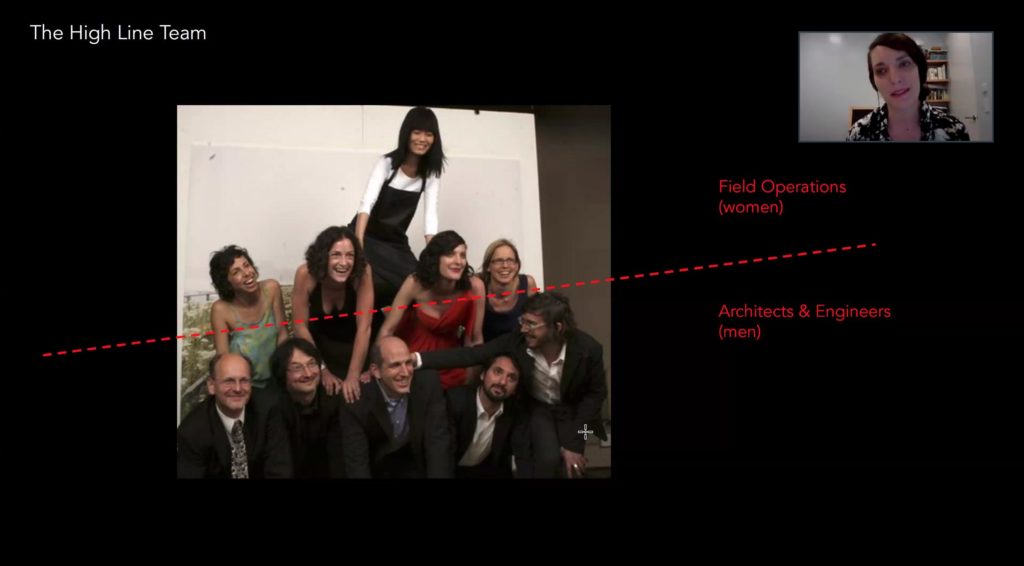
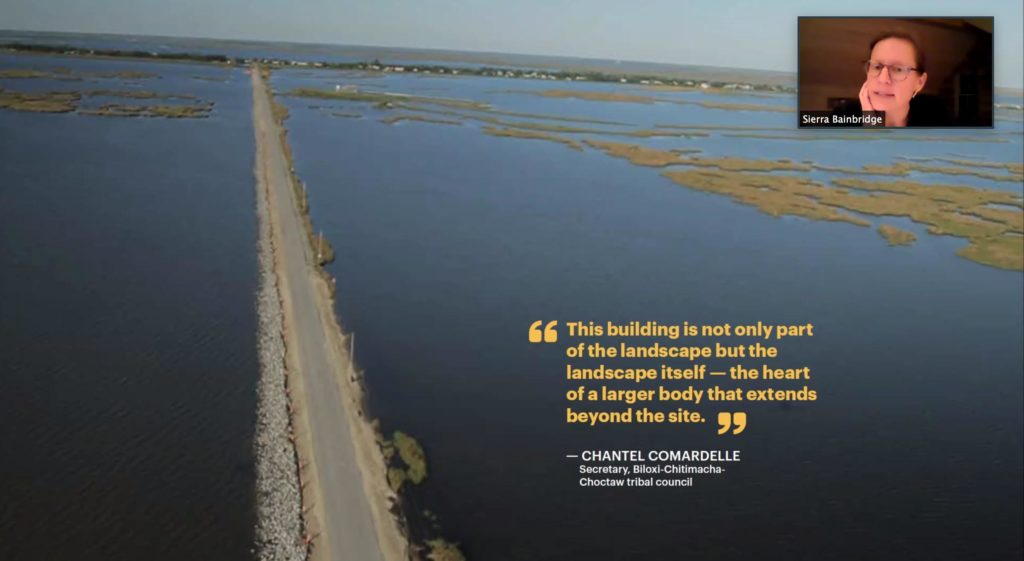
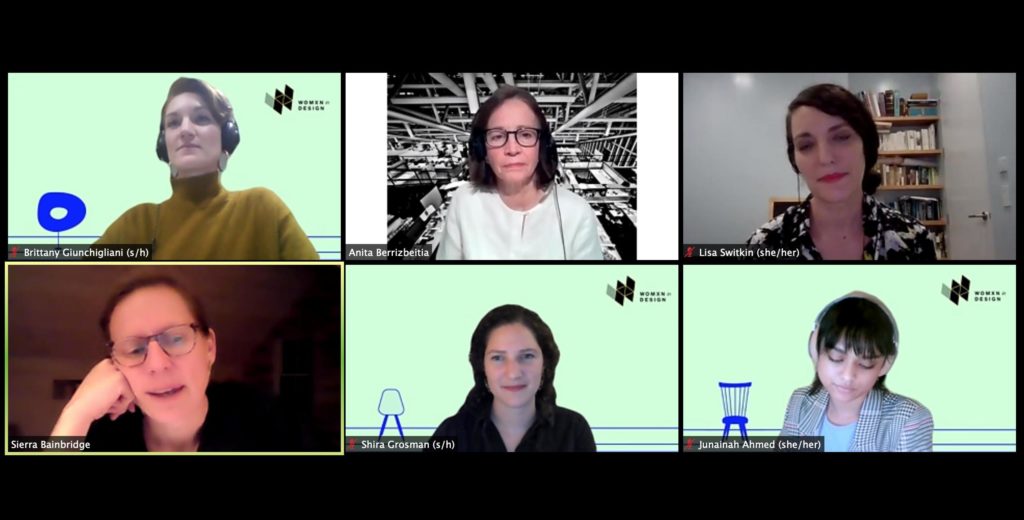
Speakers
Sierra Bainbridge was a co-founding member of MASS in 2008, and oversaw design and construction of the Butaro Hospital in Rwanda. As cross disciplinary Senior Principal and Managing Director, architect, licensed landscape architect, and educator, Sierra oversees MASS’s landscape architecture department; and the design and implementation of MASS’s projects in the United States and Africa. By working deeply across disciplines to radically reshape the material supply chain project by project, Sierra is pushing to help shift MASS’s portfolio to approach carbon neutrality as close to project completion as possible. This began with Ilima Primary school in the DCR, and continues to be tested at scale on campuses worldwide including Farm Hub in the Hudson Valley, and the Rwanda institute for Conservation Agriculture in Bugesera, Rwanda. Sierra has also worked on various memorials including EJI, the King Memorial, and the Kendall Memorial. Sierra has held an adjunct professorship at the University of Pennsylvania’s Department of Landscape Architecture, Visiting Lectureship at Harvard University’s GSD. She served as Chair of the School of Environmental Design at the University of Rwanda, where she assisted in the inception and built out of the curricula of the first architecture program in Rwanda, for the African Design Center and for RICA.
Lisa Switkin is a Senior Principal at Field Operations , a leading-edge landscape architecture and urban design practice based in New York City. With a background in urban planning and landscape architecture, Lisa is committed to improving cities through the design of a holistic and vibrant public realm, inspired by place, people, and nature. For 20 years, Lisa has helped to shape New York City’s public spaces including the design and delivery of the High Line since 2004; Domino Park in Brooklyn; the transformative master plan for Staten Island’s Freshkills Park; Gansevoort Peninsula in Hudson River Park; and most recently the “Neighborhoods Now” initiative, in collaboration with the Bedford Stuyvesant Restoration Corporation, Urban Design Forum, and the Van Alen Institute, to develop safe and inspirational reopening strategies during the COVID-19 pandemic. Other signature projects include Santa Monica’s Tongva Park, Philadelphia’s Race Street Pier, Nicollet Mall in Minneapolis, Newark’s Riverfront Park, The Underline in Miami, Shelby Farms Park in Memphis, and Seattle’s Central Waterfront.
Lisa currently serves as President of the Landscape Architecture Foundation . She was a Rome Prize recipient in 2008 and has taught graduate level design studios and lectured at universities, symposiums, foundations, and institutions around the world.
How to Join
Register to attend the lecture here . Once you have registered, you will be provided with a link to join the lecture via Zoom. This link will also be emailed to you.
The event will also be live streamed to the GSD’s YouTube page . Only viewers who are attending the lecture via Zoom will be able to submit questions for the Q+A. If you would like to submit questions for the speakers in advance of the event, please click here .
Live captioning will be provided during this event. A transcript will be available roughly two weeks after the event, upon request.
Sheila Foster, “Co-Cities: Reimagining the City as a Commons”
The GSD is pleased to present a series of talks and webinars broadcast to our audiences via Zoom.
*This lecture will be ONLINE ONLY. For security reasons, virtual attendees must register. Scroll down to find complete instructions for how to register.
Event Description
In the U.S., and around the world, vacant and abandoned urban land and structures are more ubiquitous than most people realize. In this lecture, Professor Foster will argue why we should think about this urban infrastructure as a “commons” capable of meeting the social and economic needs of the most vulnerable urban populations. Thinking of the city as a commons recognizes as legitimate, even innovative, the collective action of urban actors who utilize land and other infrastructure to construct informal settlements, community gardens and urban farms, mesh wireless networks, and new limited equity housing and commercial spaces that are then collaboratively stewarded by an identified community or group of people. Thinking of the city as a commons requires us to move beyond the public/private and market/state binaries when thinking about urban development and revitalization. It is in the space between public and private, market and state, where we can find a set of rich conceptual and practical solutions to enduring racial and economic inequities that continue to plague many communities around the world, particularly those on the margins—social, economic, and geographic—of so many cities.
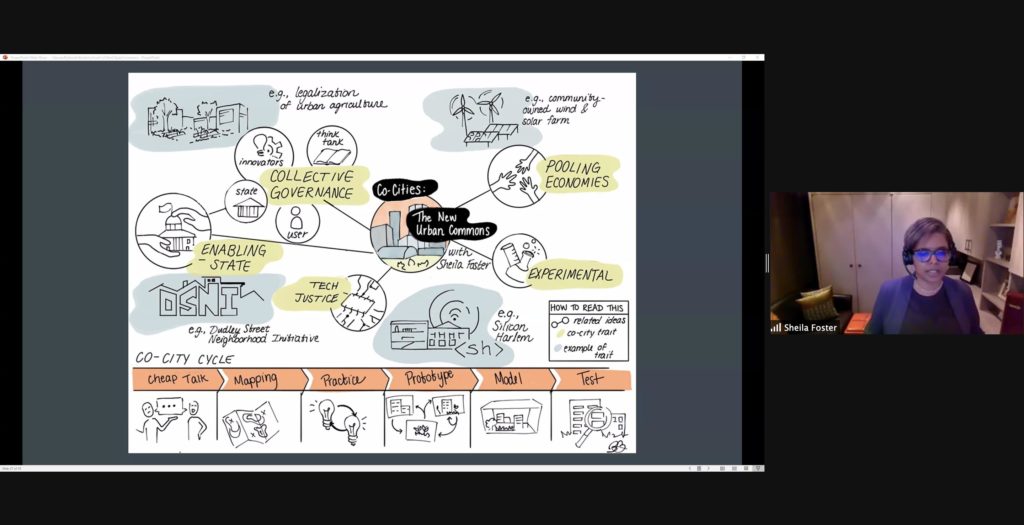
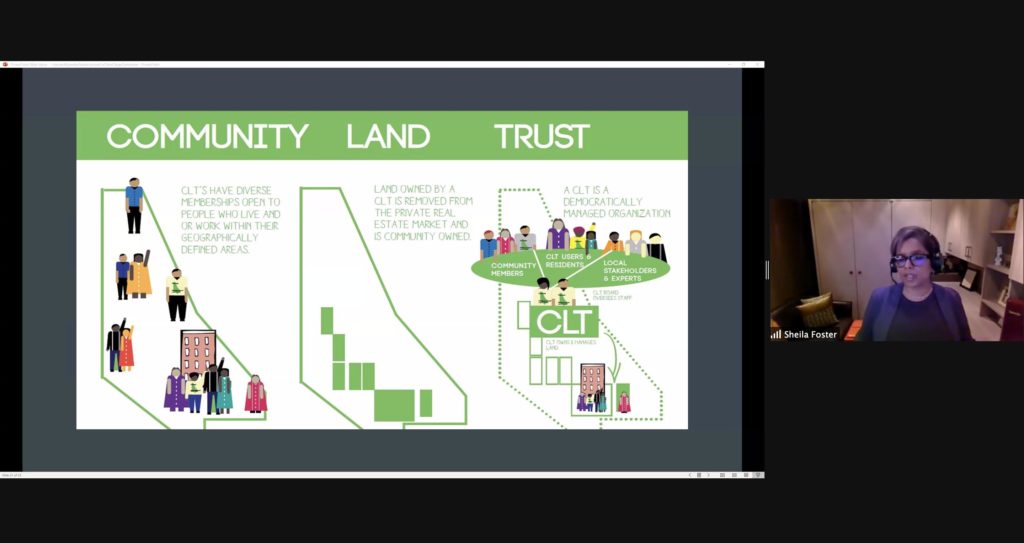
Speaker
Sheila R. Foster , COL ’83, is the Scott K. Ginsburg Professor of Urban Law and Policy at Georgetown University. She holds a joint appointment with the Law School and the McCourt School of Public Policy. She is also the faculty advisor of the Georgetown Project on State and Local Government Policy and Law (SALPAL) and lead researcher for the Georgetown Global Cities Initiative’s City Diplomacy Project .
Professor Foster’s work focuses on the intersection of law, policy, and governance with a specific focus on urban communities and cities. She is one of the leading scholars on environmental justice and is the co-author of one of the field’s seminal books, From the Ground Up: Environmental Racism and the Rise of the Environmental Justice Movement (NYU Press). Her work in that field was recently recognized by the IUCN Academy of Environmental Law’s 2018 Senior Scholarship Award. Her other work is published in top law journals including Yale, Berkeley, Harvard, and Notre Dame, among others.
Her most recent work explores local development and urban governance through the lens of the “commons” as set forth in her article The City as a Commons , Yale Law and Policy Review (2016) and her forthcoming MIT Press Book, Co-Cities (both with C. Iaione). She is also completing a forthcoming Cambridge University Press edited volume (with C. Swiney), Cambridge Handbook on Innovations in Commons Scholarship.
Foster has applied her framework of the city as a commons through LabGov , an international applied research project that she co-directs with Christian Iaione. LabGov works directly with local governments and local communities on experimental projects and policies that enable city residents to steward land, digital, and other resources within their communities. Past and present LabGov projects include working in Bologna, Rome, Amsterdam, Harlem/NYC, San Jose Costa Rica, Sao Paolo, and Baton Rouge.
Foster has been at the forefront of other urban policy and governance innovations, serving as the chair of the Global Parliament of Mayors advisory committee, a member of the New York City’s Mayors Panel on Climate Change, and an advisory board member of the Marron Institute for Urban Management at NYU.
Follow Sheila Foster on Twitter.
How to Join
Register to attend the lecture here . Once you have registered, you will be provided with a link to join the lecture via Zoom. This link will also be emailed to you.
The event will also be live streamed to the GSD’s YouTube page . Only viewers who are attending the lecture via Zoom will be able to submit questions for the Q+A. If you would like to submit questions for the speaker in advance of the event, please click here .
Live captioning will be provided during this event. A transcript will be available roughly two weeks after the event, upon request.
Nikil Saval, “A Rage in Harlem”
The GSD is pleased to present a series of talks and webinars broadcast to our audiences via Zoom.
*This lecture will be ONLINE ONLY. For security reasons, virtual attendees must register. Scroll down to find complete instructions for how to register.
Event Description
This talk will consider the moment when June Jordan and Buckminster Fuller attempted to reimagine Harlem in the wake of the 1964 riots, considered against a larger context of experiments in social housing, environmental planning, urban rebellion, and Afro-futurism.
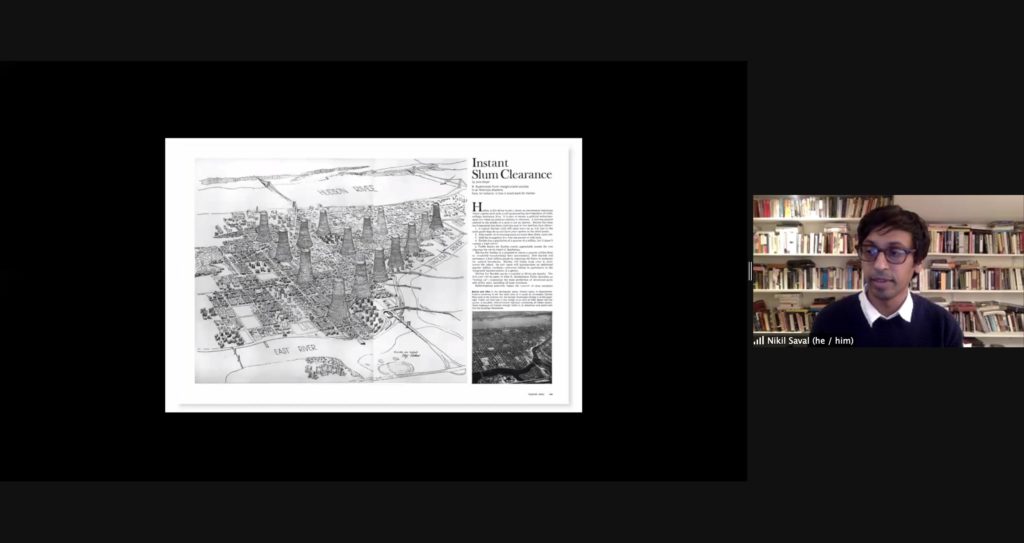
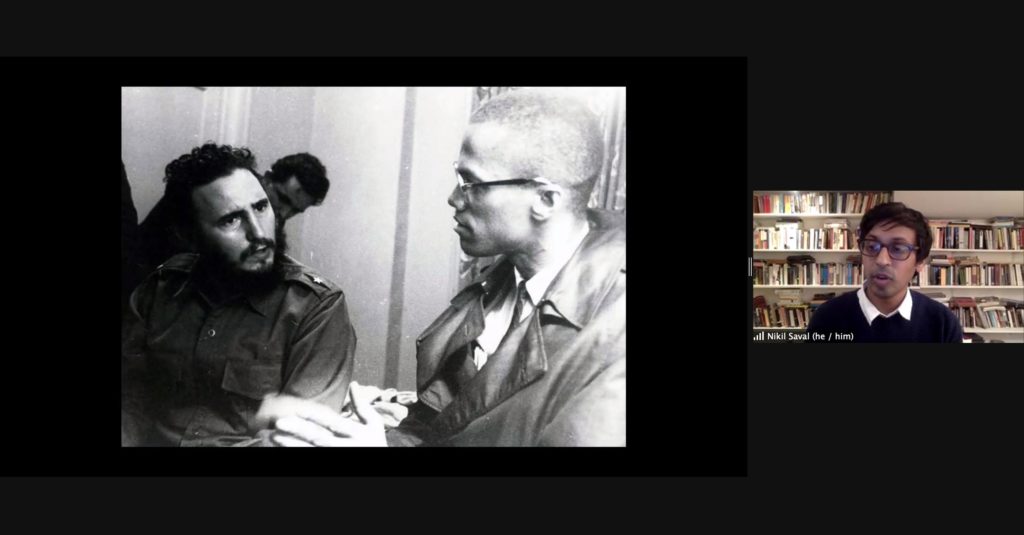
Speaker
Nikil Saval is an editor, writer, and community organizer. He was co-editor of n+1 and a contributing writer for the New Yorker, and is a frequent writer for the New York Times, covering architecture, urbanism, and design. He is the author of Cubed: A Secret History of the Workplace (Doubleday, 2014), and he is currently working on a book titled Everything is Architecture, a study of the politics of industrial design. He co-founded Reclaim Philadelphia , a progressive organization, and is the Democratic nominee for State Senate in the First Senate District in Pennsylvania. He has a B.A. from Columbia University, and a PhD from Stanford University, both in English Literature.
Follow Nikil Saval on Twitter and Instagram .
How to Join
Register to attend the lecture here . Once you have registered, you will be provided with a link to join the lecture via Zoom. This link will also be emailed to you.
The event will also be live streamed to the GSD’s YouTube page . Only viewers who are attending the lecture via Zoom will be able to submit questions for the Q+A. If you would like to submit questions for the speaker in advance of the event, please click here .
Live captioning will be provided during this event. A transcript will be available roughly two weeks after the event, upon request.
Alex Krieger, “The American City Prior and (Possibly) Following the Pandemic”
The GSD is pleased to present a series of talks and webinars broadcast to our audiences via Zoom.
*This lecture will be ONLINE ONLY. For security reasons, virtual attendees must register. Scroll down to find complete instructions for how to register.
Event Description
American instincts oscillate between the allure of the city and that of life free of city stress; between the temptations of the metropolis, and bucolic retreat from those very centers of civic life. Such oscillations, occurring across American history, have on the one hand enabled the building of Manhattan, the ‘Capital of Capitalism’ (and culture, too) and the invention of the ‘garden suburb’ where family grace was to dwell, prior to metastasizing into sprawl. Drawing on research from his 2019 book, City on a Hill , Krieger’s lecture will track American ideals and shortcomings in these efforts to re-invent settlement.
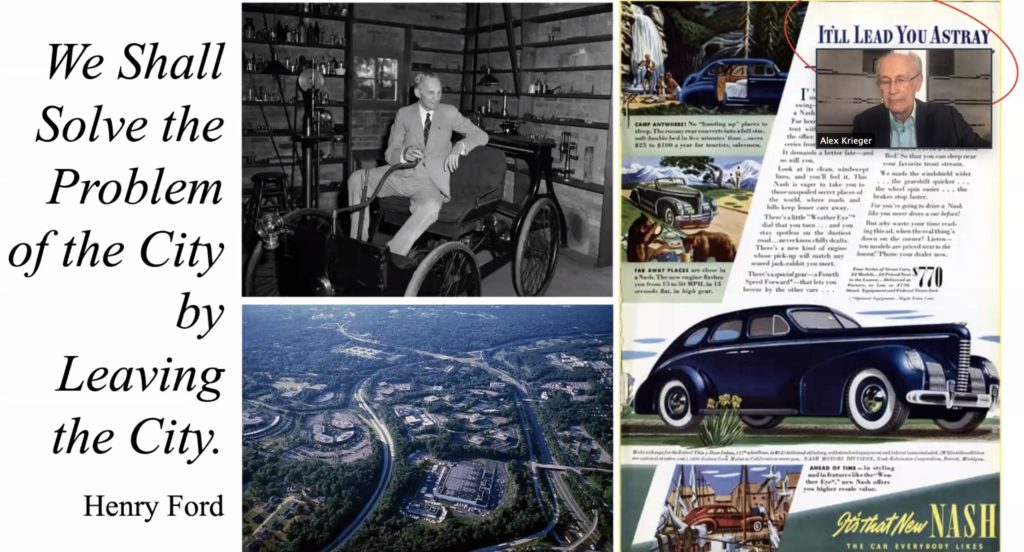
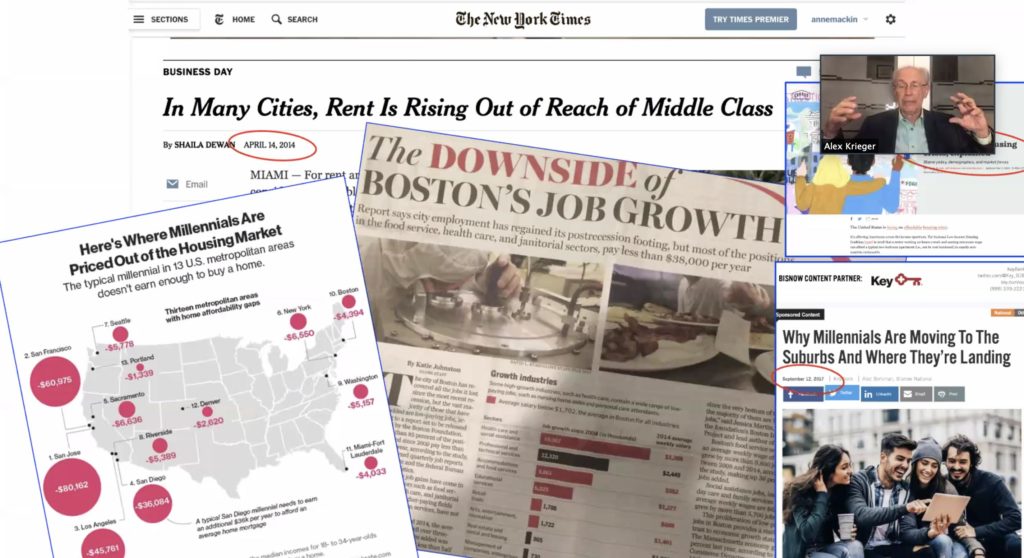
Speaker
Alex Krieger, FAIA, MCU ’77, has combined a career of teaching and practice, dedicating himself in both to understanding how to improve the quality of place and life in our major urban areas.
Mr. Krieger is Research Professor in Practice of Urban Design at the Harvard University Graduate School of Design, where he has taught since 1977. He served as Chair of the Department of Urban Planning and Design (1998-2004, 2006-2007, 2019-2020), Director of the Urban Design Program (1990-2001), and as Associate Chair of the Department of Architecture (1984-1989). In addition to design studios and seminar courses at the GSD, he teaches a General Education course on the evolution of American cities at Harvard College. In 2017, he was named one of the Fifteen Professor of the Year by the Harvard Crimson.
Mr. Krieger is also a principal at NBBJ , a global design practice. He was founding principal of Chan Krieger Sieniewicz until their merger with NBBJ in 2009. Since 1984, he has provided architecture, urban design, and urban planning services to a broad array of clients in numerous cities worldwide, focusing primarily on educational, institutional, healthcare, and public projects in complex urban settings.
In addition to serving on university-wide committees to improve Harvard’s main campus and their expansion in Allston, Mr. Krieger has also served as: member of the United States Commission of Fine Arts (2012-present); member of the Riley Institute (2000-present); founder of the Big City Planning Directors Institute (1999-present); director of the Mayors’ Institute on City Design (1994-1999); member of the New England Holocaust Memorial Committee (1989-2000); and member of the Boston Civic Design Commission (1989-1997). He is also a board member for the Boston Public Library’s Norman B. Leventhal Map and Education Center and for Historic Boston.
Mr. Krieger received a Bachelor of Architecture from Cornell University and a Master of City Planning in Urban Design from the Harvard University Graduate School of Design.
Major publications include: City on a Hill: Urban Idealism in America from the Puritans to the Present (Harvard University Press, 2019); Urban Design (with William Saunders, University of Minnesota Press, 2009); Remaking the Urban Waterfront (with Bonnie Fisher et al., Urban Land Institute, 2004); Mapping Boston (with David Cobb and Amy Turner, MIT Press, 1999); Towns and Town-Making Principles (with Andrés Duany et al., Rizzoli, 1991); and A Design Primer for Cities and Towns (with Anne Mackin, Massachusetts Council on the Arts and Humanities, 1989).
How to Join
Register to attend the lecture here . Once you have registered, you will be provided with a link to join the lecture via Zoom. This link will also be emailed to you.
The event will also be live streamed to the GSD’s YouTube page . Only viewers who are attending the lecture via Zoom will be able to submit questions for the Q+A. If you would like to submit questions for the speaker in advance of the event, please click here .
Live captioning will be provided during this event. After the event has ended, a transcript will be available upon request.
Emmanuel Pratt, “[Re]Constructing Real Estate: The Question of Value”
The GSD is pleased to present a series of talks and webinars broadcast to our audiences via Zoom.
*This lecture will be ONLINE ONLY. For security reasons, virtual attendees must register. Scroll down to find complete instructions for how to register.
Event Description
Sweet Water Foundation (SWF) is a community-rooted, nonprofit organization that practices Regenerative Neighborhood Development to create safe and inspiring spaces and curates healthy, intergenerational communities transforming the ecology of so-called ”blighted” neighborhoods. Utilizing a unique blend of urban design, urban agriculture, carpentry, art, and STE(A+)M focused education, the primary objective of SWF’s work is the continued healing of the neighborhood, its land and its people, and re-rooting of the community through a unique intersection across education, agriculture, arts, culture, and housing.
Since 2014, SWF has created a series of urban acupuncture inspired installations that actively re-story and re-construct a neighborhood located at the nexus of Englewood and Washington Park, two African American communities directly impacted by redlining and long standing histories of municipal disinvestment. SWF’s headquarters site has become a dynamic, living campus now known as “The Commonwealth.” The Commonwealth spans four contiguous city blocks and includes more than three acres of urban farmland, open community gardens, a carpentry workshop, two formerly foreclosed homes transformed into live-work-learn spaces, and a timber frame barn that serves as a pavilion for a wide variety of community gatherings for public programming.
For this event with the GSD, Emmanuel will contextualize the historical degeneration vs regeneration of The Commonwealth to present date, lead viewers on a virtual site visit, and share some upcoming developments emerging across a network of value-based partners.
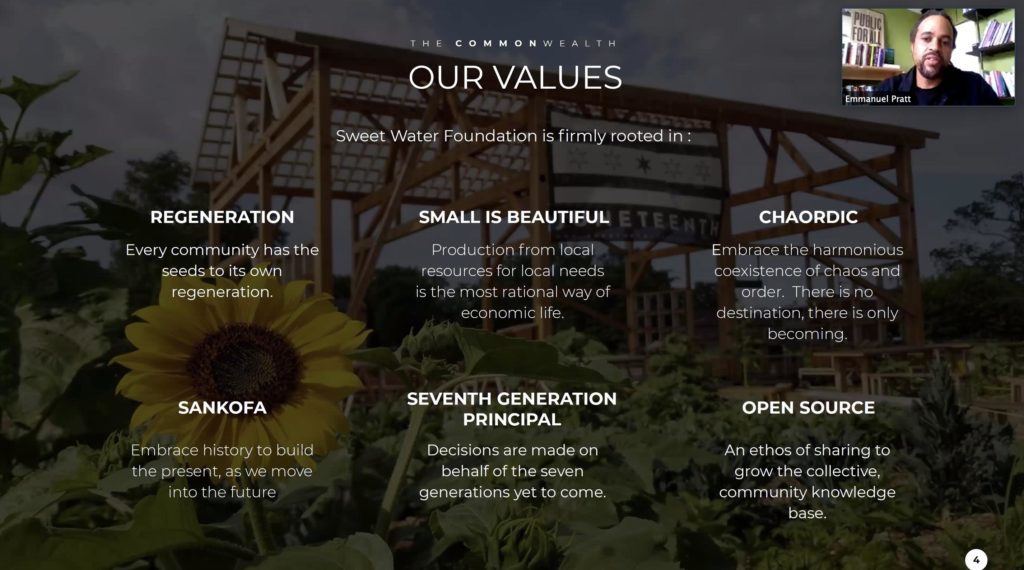
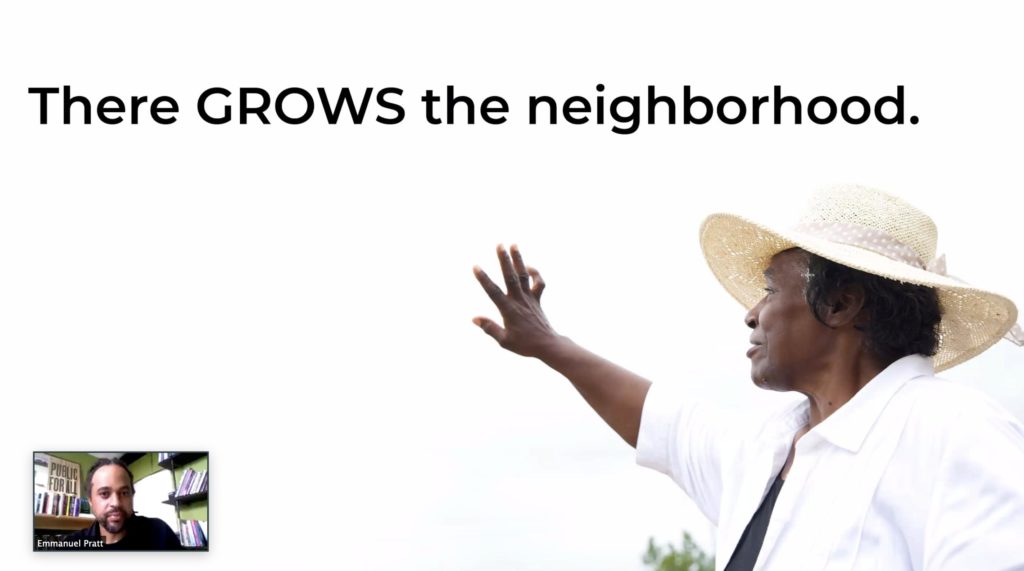
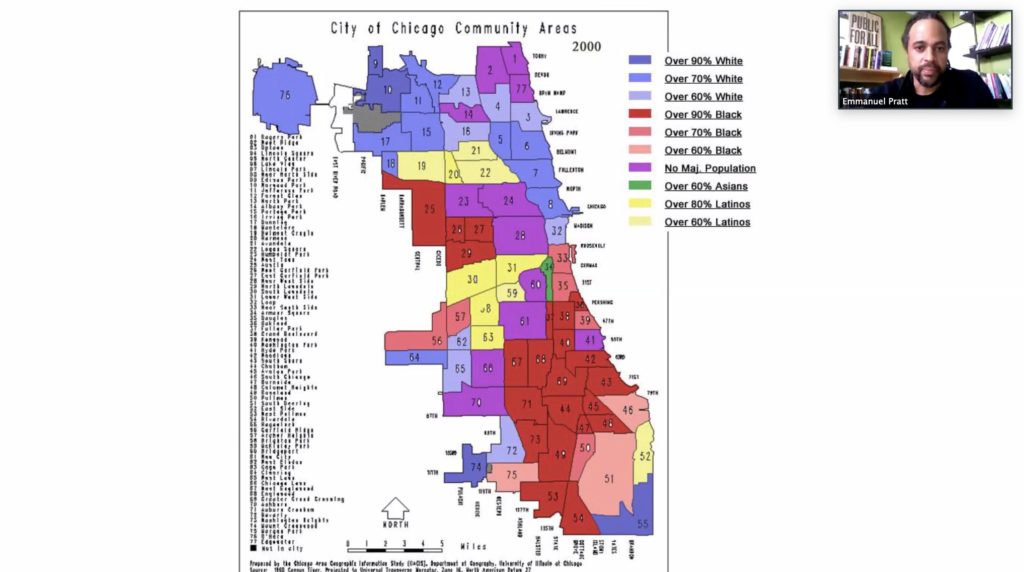
Speaker
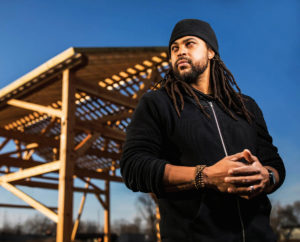
Emmanuel Pratt, LF ‘17, received a BArch (1999) from Cornell University and an MSAUD (Master of Science in Architecture and Urban Design, 2003) from Columbia University. From 2011 to 2019, Pratt served as the director of aquaponics at Chicago State University, and he was the Charles Moore Visiting Professor at the Taubman College of Architecture and Urban Planning at the University of Michigan until 2019. In 2016, he was named a Loeb Fellow at the Harvard University Graduate School of Design. Currently, Pratt is co-founder and executive director of the Sweet Water Foundation in Chicago and visiting lecturer in the Environmental and Urban Studies Program at the University of Chicago.
Follow the Sweet Water Foundation on Twitter.
How to Join
Register to attend the lecture here . Once you have registered, you will be provided with a link to join the lecture via Zoom. This link will also be emailed to you.
The event will also be live streamed to the GSD’s YouTube page . Only viewers who are attending the lecture via Zoom will be able to submit questions for the Q+A. If you would like to submit questions for the speaker in advance of the event, please click here .
Live captioning will be provided during this event. After the event has ended, a transcript will be available upon request.
Seth Denizen, “Thinking Through Soil: Case Study from the Mezquital Valley”
The GSD is pleased to present a series of talks and webinars broadcast to our audiences via Zoom.
*This lecture will be ONLINE ONLY. For security reasons, virtual attendees must register. Scroll down to find complete instructions for how to register.
Event Description
Almost 200,000 acres of land in the fertile Mezquital Valley are irrigated with the untreated sewage of Mexico City. Every drop of rain, urban runoff, industrial effluent, and sewage in Mexico City is sent to the Mezquital Valley through a 60 kilometer pipe. Soils in this valley have been continuously irrigated with urban wastewater since 1901, longer than any other soil in the world. The capacity of these soils to produce conditions in which agriculture can be practiced safely and produce healthy crops depends on a complex negotiation between soil chemistry, farming practices, public policy, land management, and the urban design of Mexico City. Without this wastewater, the Mezquital Valley would be a desert, as it falls into the UN’s “drylands” climate category, where rates of evapotranspiration exceed precipitation. Currently, more than 40% of the Earth’s surface is classified as “drylands.” In the context of a warming planet, the world simply cannot afford for urban wastewater reuse to fail. Water is scarce, and food security is fragile. In this context, the question becomes: what would the city look like if it needed to produce a fertile agricultural soil from its waste? What would the farm look like if it better anticipated its material connection to the bodies of 20 million people and the effluent of urban life?
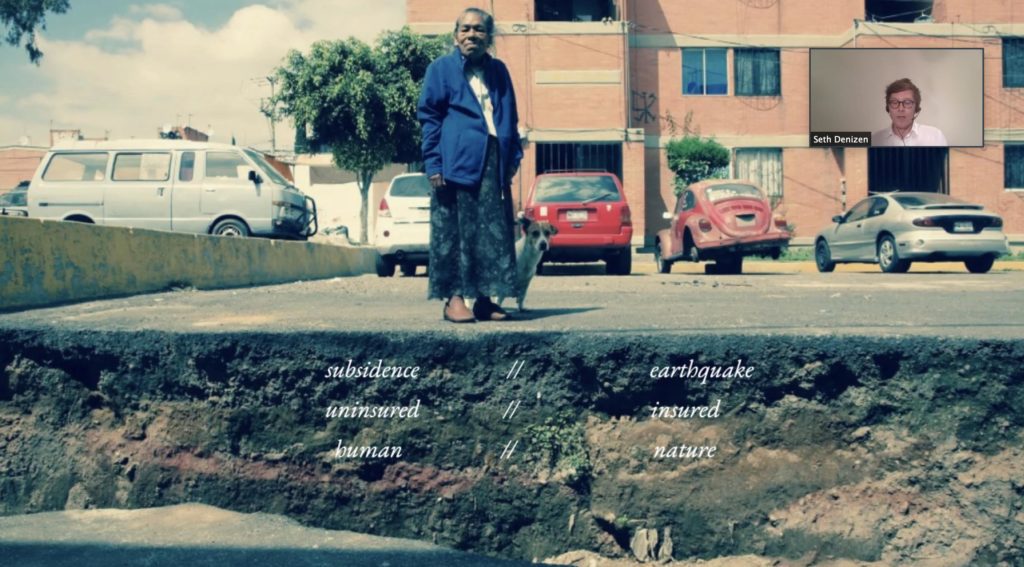
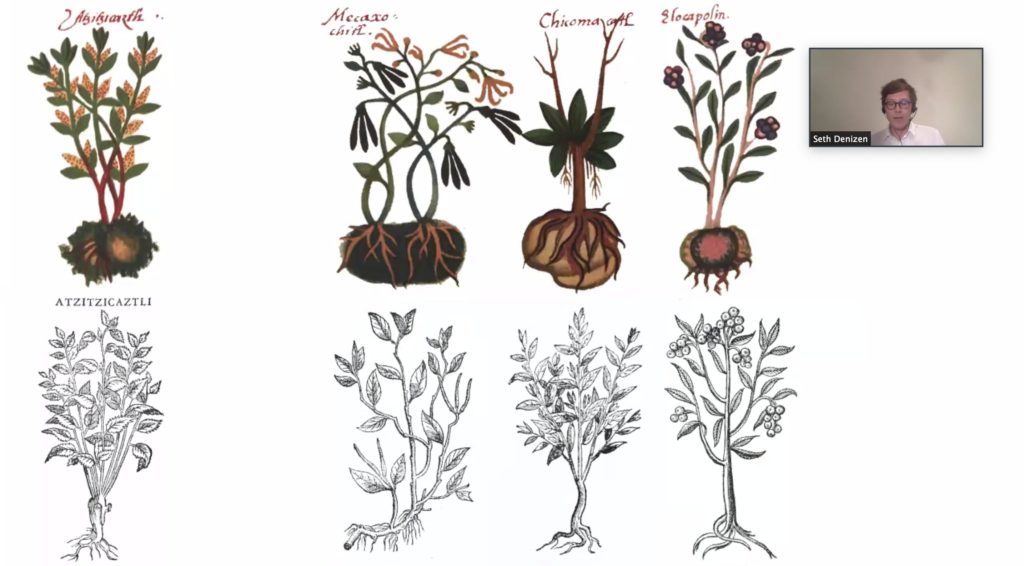
Speaker
Seth Denizen is a researcher and design practitioner trained in landscape architecture and human geography. He has received design awards from the SOM Foundation, Urban Edge Awards, and Bauhaus Dessau Foundation (2013), while also publishing widely on art and design with the Asia Art Archive, LEAP International Art Magazine of Contemporary China, Volume, Fulcrum, among others. He is currently a member of the editorial board of Scapegoat Journal: Architecture/Landscape/Political Economy . Collaborations include scientific research on Hong Kong’s urban microbiome, as well as art exhibitions in the Blackwood Gallery (Toronto), The Kunsthal (Netherlands), and Para/Site Art Space (Hong Kong). After teaching Landscape Architecture at the University of Hong Kong and the University of Virginia, Seth recently completed a PhD in Geography at the University of California Berkeley. His doctoral research investigates the vertical geopolitics of urban soil in Mexico City, where he is working with geologists and soil scientists to characterize the material complexities and political forces that shape the distribution of geological risk in Mexico’s urban periphery.
Follow Seth Denizen on Twitter .
How to Join
Register to attend the lecture here . Once you have registered, you will be provided with a link to join the lecture via Zoom. This link will also be emailed to you.
The event will also be live streamed to the GSD’s YouTube page . Only viewers who are attending the lecture via Zoom will be able to submit questions for the Q+A.
Live captioning will be provided during this event. After the event has ended, a transcript will be available upon request.
